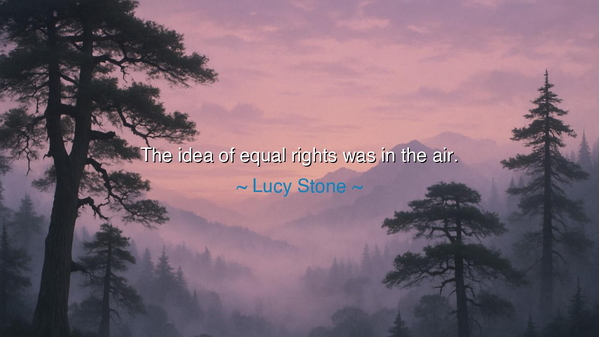
The idea of equal rights was in the air.






“The idea of equal rights was in the air.” These simple yet profound words by Lucy Stone, one of the earliest and most steadfast champions of women’s suffrage in America, capture the essence of a moment when the spirit of justice began to awaken in the hearts of humanity. Her phrase is light as breath and yet mighty as thunder. It evokes an age when equality was no longer confined to whispers or dreams — it had become an atmosphere, a living current that moved unseen but unstoppable. Stone’s reflection reminds us that there are moments in history when the moral winds shift, when ideas once radical become inevitable, and when truth itself takes flight through every soul ready to breathe it in.
When Stone said that “the idea of equal rights was in the air,” she was speaking of a generation electrified by transformation. The mid-nineteenth century was an age of awakening: abolitionists challenged the chains of slavery, reformers spoke against the injustices of labor and class, and women, long silent in the halls of power, began to find their voices. Stone herself stood at the crossroads of these movements. She was among the first women in America to earn a college degree, and from that day forward, she vowed to dedicate her life to the cause of equality — for women, for the enslaved, and for all the oppressed. Her words were not born of theory, but of fire — the fire of a people who had begun to see freedom as their divine inheritance.
The origin of Stone’s declaration can be traced to the great wave of reform that swept through the United States before the Civil War. The Abolitionist Movement had planted in the minds of millions the belief that no human being should live in bondage. That same wind of conscience carried with it another seed — the recognition that women, too, were denied their rights under law and society. The world was changing, and Stone felt it. She once stood before crowds who laughed at the thought of women speaking in public, and yet, through her courage, those same crowds learned to listen. Her statement — that equal rights were “in the air” — captures that mysterious and sacred moment when truth becomes contagious, spreading from heart to heart like dawn breaking over a sleeping land.
Consider the gathering at Seneca Falls in 1848, where Elizabeth Cady Stanton and Lucretia Mott led the first women’s rights convention. There, for the first time, women publicly declared that they were entitled to the same rights as men — in education, in property, in politics, and in dignity. Lucy Stone, though not present, was kindred in spirit. The Declaration of Sentiments, written that day, echoed the American Declaration of Independence, proclaiming that “all men and women are created equal.” The courage of those women and men was not isolated genius; it was the voice of an age that had inhaled the air of justice. They were the embodiment of Stone’s truth — that once an idea is breathed into the world, no power can suffocate it.
Stone’s phrase also speaks to the mystery of progress — that human liberation often begins not with laws or revolutions, but with a change in the collective soul. Before justice can be written into constitutions, it must first be written upon hearts. The air she spoke of was not made of words or policies; it was made of hope, empathy, and awakening. In every generation, such an atmosphere returns: in the struggle for civil rights under Martin Luther King Jr., in the marches for women’s equality, in the voices demanding freedom and fairness across the world today. Wherever truth is spoken and heard, the air changes — and those who breathe it cannot return to silence.
But Stone’s wisdom also carries a warning. Ideas in the air are fragile until they take root in action. The wind can carry them, but only courage can make them real. She did not stop at words — she traveled across the nation, facing ridicule and hostility, to plant equality in the hearts of others. She refused to take her husband’s name in marriage, a symbol of her belief that woman was not property but person. Her life was proof that when the air is filled with vision, one must rise to embody it. For every age has its invisible wind — but it is the hands and hearts of the brave that turn that wind into movement.
So, let this be the lesson drawn from Lucy Stone’s words: when the idea of equal rights fills the air, breathe deeply of it. Let it fill your lungs with courage and your mind with resolve. Do not stand idle while it passes by — speak it, live it, defend it. For the air of equality is the breath of human dignity itself, and though it may drift unseen, it has the power to awaken nations. Each generation must take its turn to breathe that sacred air and to act upon it, lest injustice suffocate the world once more. Remember always that truth, once released into the atmosphere of human conscience, can never truly die — it moves with the wind, and one day, it changes the world.






AAdministratorAdministrator
Welcome, honored guests. Please leave a comment, we will respond soon